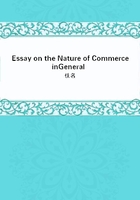
第64章
The Paris bankers have often observed that the same bag of money has come back to them 4 or 5 times in the same day when they had a good deal to pay out and receive.
I think pubic banks of very great utility in small States and those where silver is rather scarce, but of little service for the solid advantage of a great State.
The Emperor Tiberius, a Prince strict and economical, had saved up in the Imperial Treasury 2700 millions of sesterces, equal to 25 millions sterling or 100 million ounces of silver, an enormous sum in coin for those times and even for today. It is true that in tying up so much money he embarrassed the circulation and that silver became scarcer at Rome than it had been.
Tiberius, who attributed this scarcity to the monopoly of Contractors and Financiers who farmed the Imperial revenues, ordered by an edict that they should buy land up to at least two thirds of their capital. This Edict, instead of animating the circulation threw it completely into disorder. All the Financiers hoarded and called in their capital under the pretext of putting themselves into a position to obey the Edict by buying land, which instead of rising in value sunk to a much lower price owing to the scarcity, of silver in circulation. Tiberius remedied this scarcity by lending to individuals on good security only 300 million sesterces, a ninth part of the money which he had in his Treasury.
If the ninth part of the Treasury sufficed at Rome to re-establish the circulation it would seem that the establishment of a general Bank in a great Kingdom where its utility would never correspond to the tenth part of the money in circulation when it is not hoarded, would be of no real and permanent advantage, and that considered in its intrinsic value it can only be regarded as an expedient for gaining time.
But a real increase in the quantity of circulating money is of a different nature. We have already spoken of it and the Treasure of Tiberius gives us again occasion to say a word of it here, This treasure of 2700 millions of sesterces, left at the death of Tiberius, was squandered by the Emperor Caligula his successor in less than a year. Money was never seen so abundant at Rome, What was the result? This mass of money plunged the Romans into luxury and into all sorts of crimes to pay for it.
More than 60,000 pounds sterling left the Empire every year for the merchandise of the Indies, and in less than 30 years the Empire grew poor and silver became very scarce there without any dismemberment or loss of a Province.
Though I consider a general Bank is in reality of very little solid service in a great State I allow that there are circumstances in which a Bank may have effects which seem astonishing.